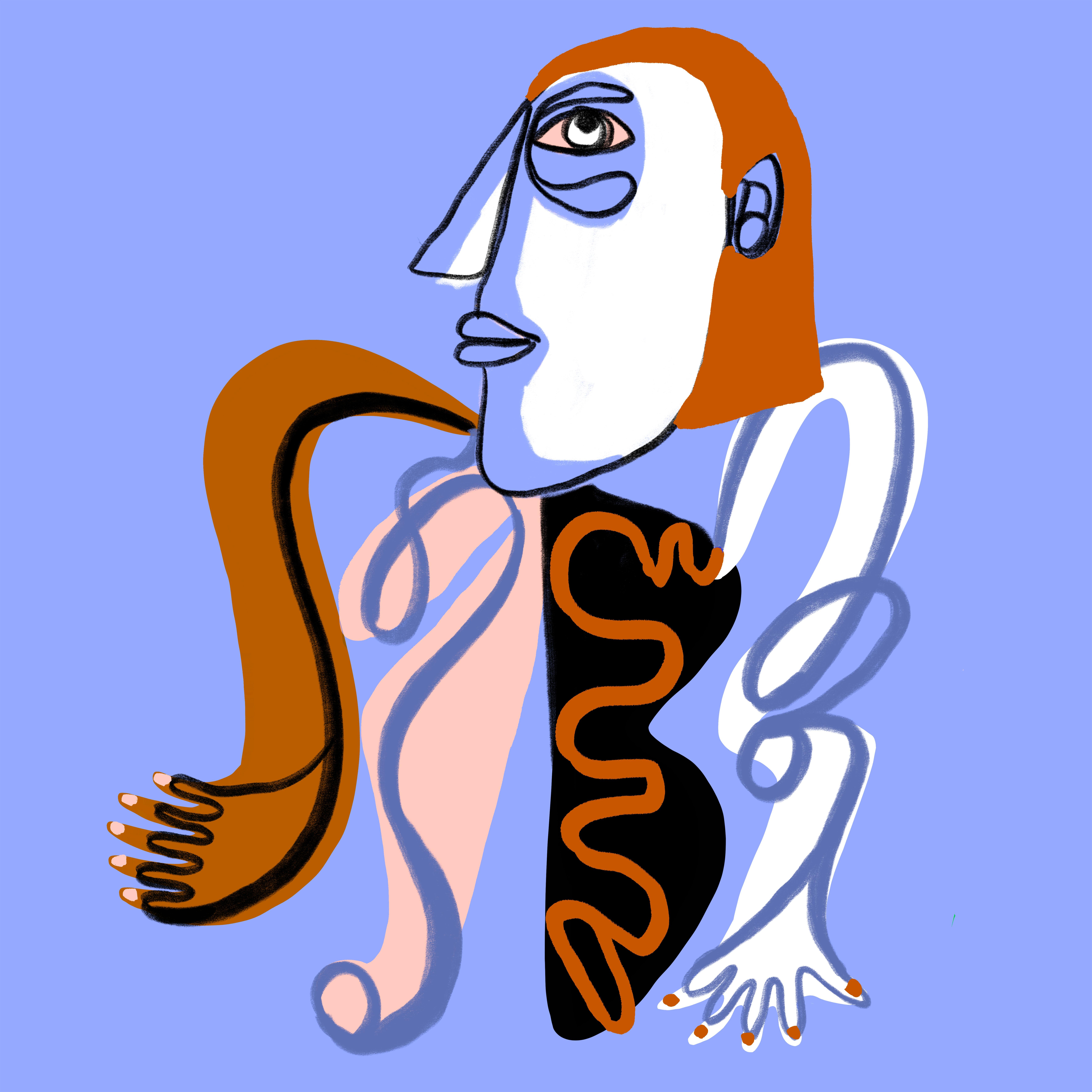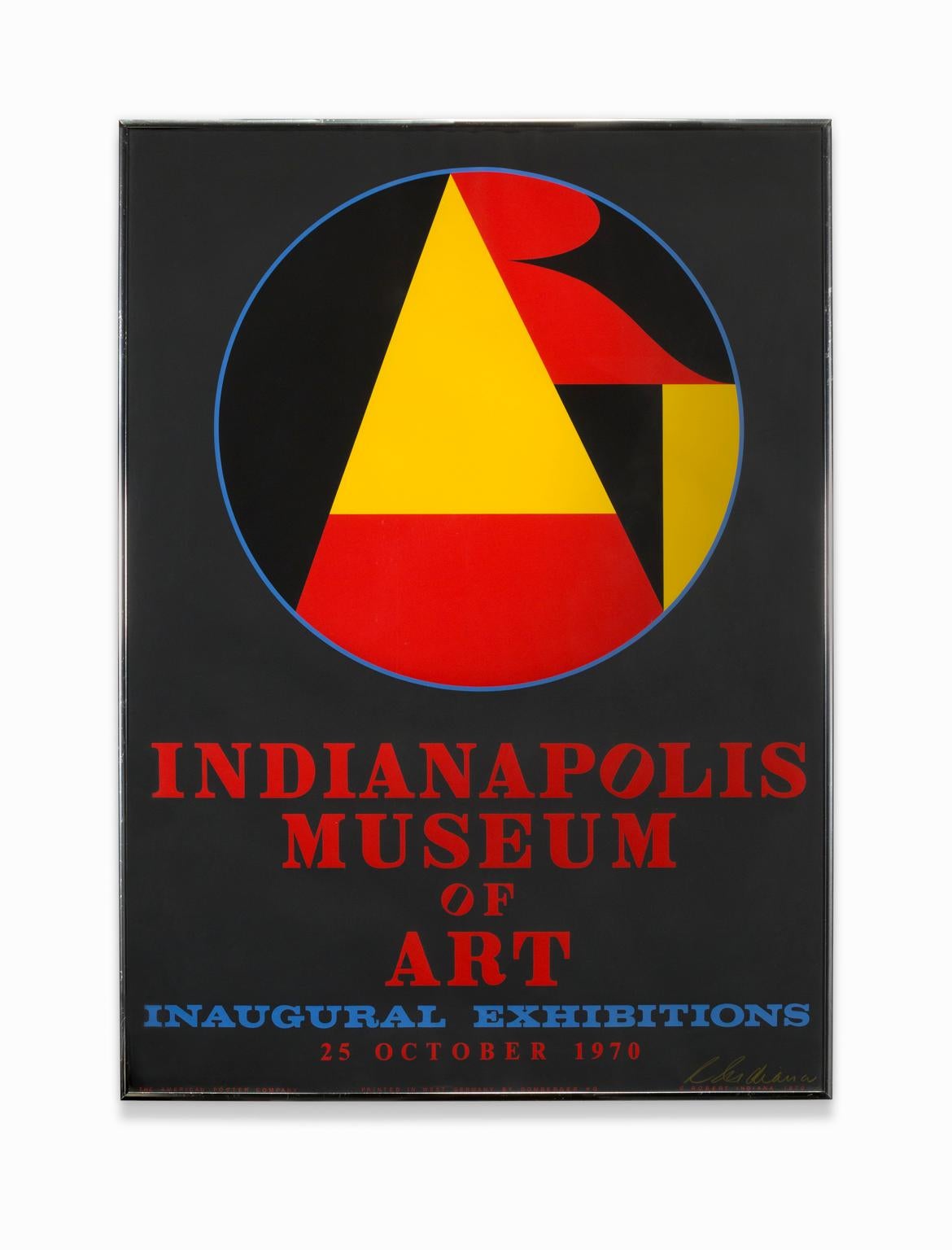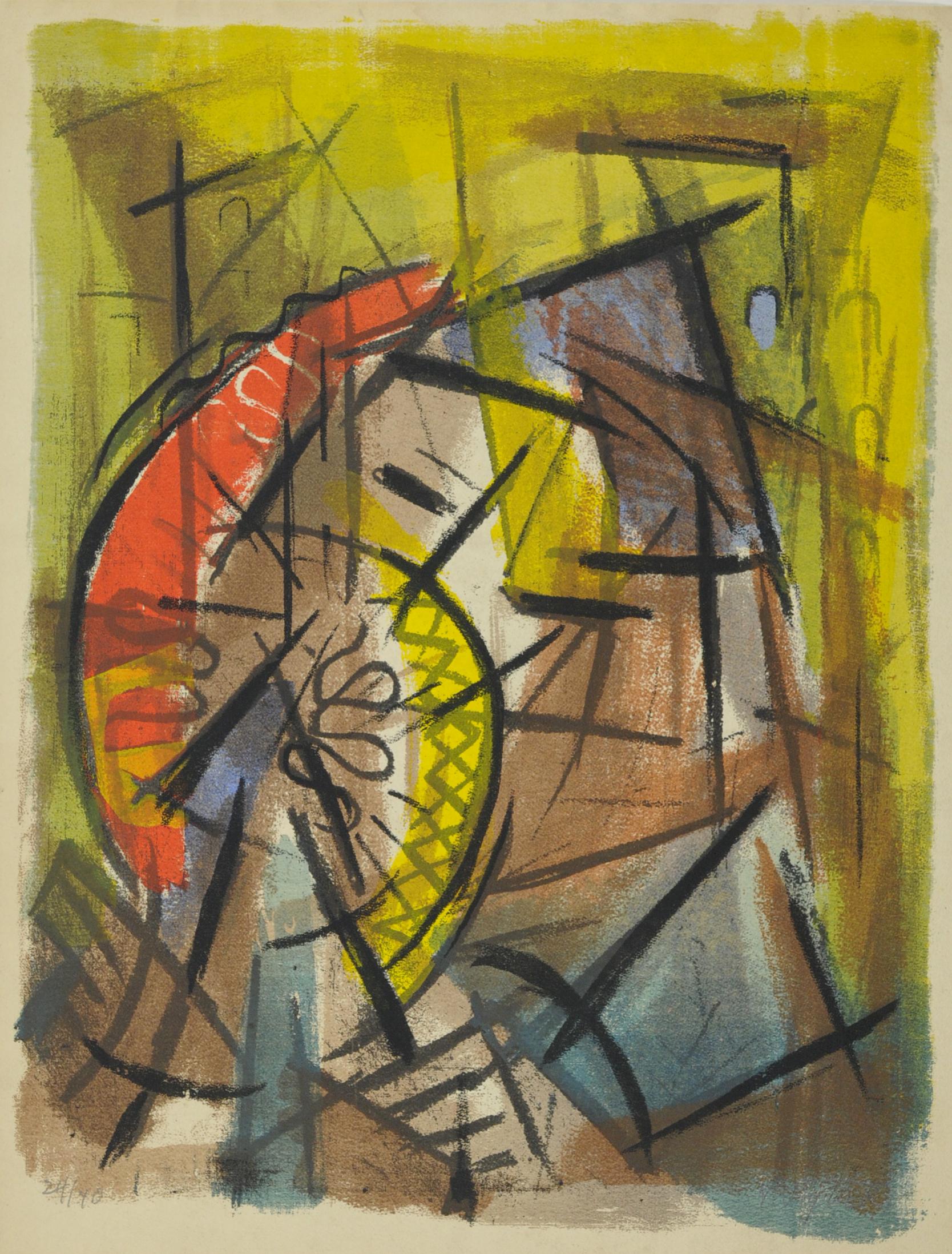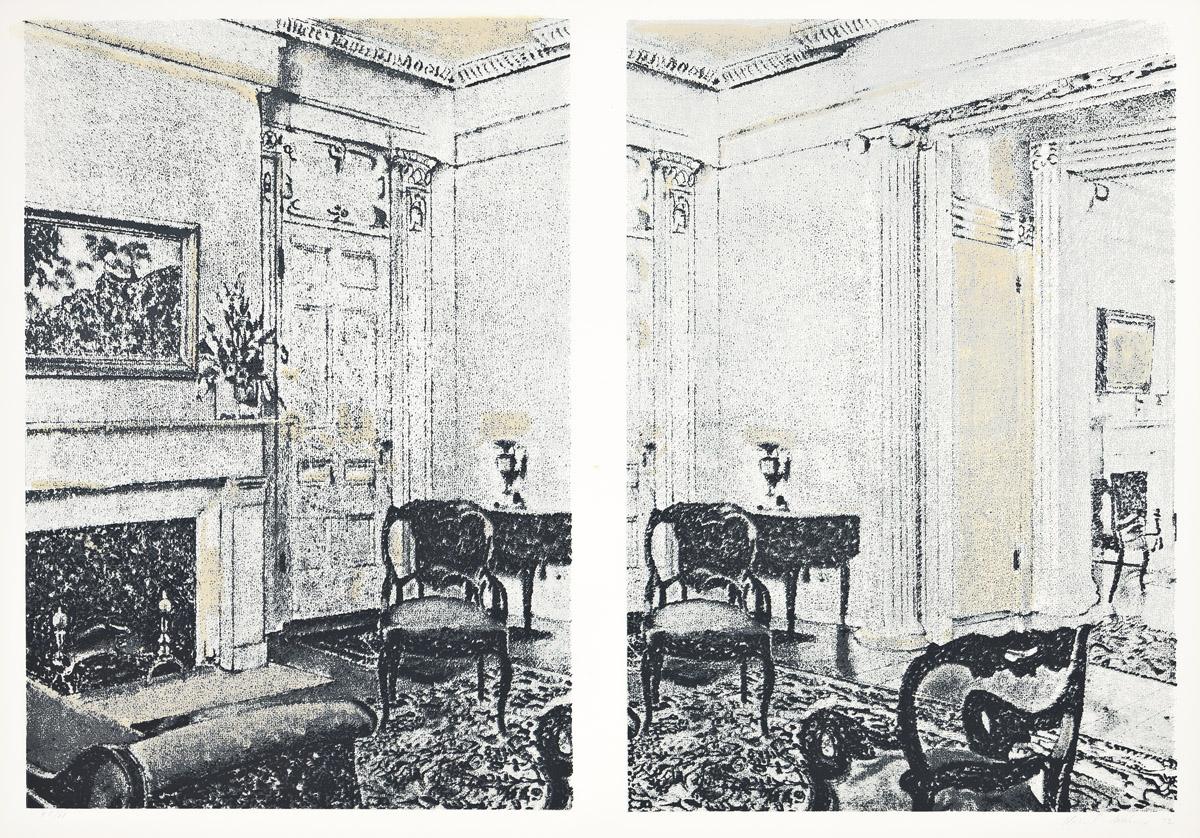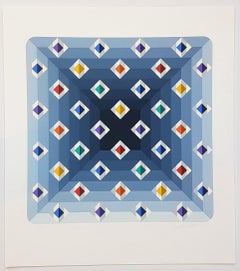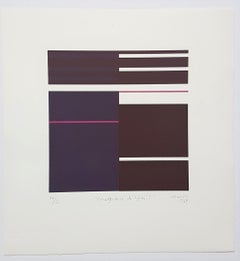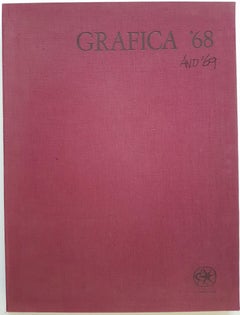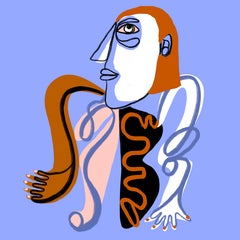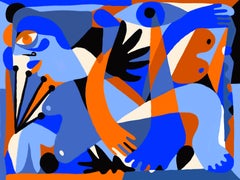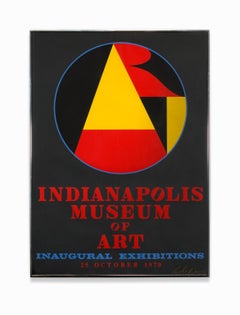Items Similar to Homage to the Square: Blue Look (Bauhaus, Minimalism, 50% OFF LIST PRICE)
Want more images or videos?
Request additional images or videos from the seller
1 of 9
(after) Josef AlbersHomage to the Square: Blue Look (Bauhaus, Minimalism, 50% OFF LIST PRICE)1973
1973
On Hold
$480
$1,00052% Off
On Hold
£362.24
£754.6752% Off
On Hold
€414.71
€863.9952% Off
On Hold
CA$676.96
CA$1,410.3352% Off
On Hold
A$743.22
A$1,548.3752% Off
On Hold
CHF 387.74
CHF 807.7952% Off
On Hold
MX$8,993.96
MX$18,737.4152% Off
On Hold
NOK 4,859.69
NOK 10,124.3652% Off
On Hold
SEK 4,579.11
SEK 9,539.8152% Off
On Hold
DKK 3,095.72
DKK 6,449.4252% Off
About the Item
Josef Albers
Homage to the Square: Blue Look (from "Albers in Bottrop") (Bauhaus)
Screenprint in brilliant Colors on strong wove paper double folded, 1973 (after original 1955 - Oil on Masonite)
Image 8 x 8 inches
Sheet: 8.95 x 9.6 inches
Framed: 12.8x12.8x0.6 inches
Published by Verlag Aurel Bongers KG, Recklinghausen, Germany - 1973
Serigraphs by Trautwein KG, Recklinghausen, Germany
Edition: Limited; 1,000
Unsigned, not numbered individually - as issued
Ref.: 924802-1909
Tags: Bauhaus,Homage to the Square,Geometric Abstraction,Color Theory,Abstract Art,Modernism,Op Art,Interaction of Color,Bauhaus School,Abstract Expressionism,Color Study,Art Education,Abstract Painter,Josef Albers Foundation,Optical Art,Square Paintings,Minimalism,Hard-edge Painting,Form and Color,Art and Science,German Artist,Color Perception,The Interaction of Color Book,Color Variants,Structural Constellations,Art of Seeing,Color Field Painting,Josef Albers Museum,Modernist Printmaker
Josef Albers (March 19, 1888 – March 25, 1976) was a German-born American artist and educator whose work, both in Europe and in the United States, formed the basis of modern art education programs of the twentieth century.
Accomplished as a designer, photographer, typographer, printmaker, and poet, Albers is best remembered for his work as an abstract painter and theorist. He favored a very disciplined approach to composition. Most famous of all are the hundreds of paintings and prints that make up the series, Homage to the Square. In this rigorous series, begun in 1949, Albers explored chromatic interactions with nested squares. Usually painting on Masonite, he used a palette knife with oil colors and often recorded the colors he used on the back of his works. Each painting consists of either three or four squares of solid planes of color nested within one another, in one of four different arrangements and in square formats ranging from 406×406 mm to 1.22×1.22 m
- Creator:(after) Josef Albers (1888 - 1976, American, German)
- Creation Year:1973
- Dimensions:Height: 12.8 in (32.52 cm)Width: 12.8 in (32.52 cm)Depth: 0.6 in (1.53 cm)
- Medium:
- Movement & Style:
- Period:
- Condition:Image intact; no issues. Overall very good vintage condition and no structural issues or damage.
- Gallery Location:Kansas City, MO
- Reference Number:1stDibs: LU608313351502
About the Seller
5.0
Platinum Seller
Premium sellers with a 4.7+ rating and 24-hour response times
Established in 2016
1stDibs seller since 2017
1,107 sales on 1stDibs
Typical response time: <1 hour
- ShippingRetrieving quote...Shipping from: Kansas City, MO
- Return Policy
Authenticity Guarantee
In the unlikely event there’s an issue with an item’s authenticity, contact us within 1 year for a full refund. DetailsMoney-Back Guarantee
If your item is not as described, is damaged in transit, or does not arrive, contact us within 7 days for a full refund. Details24-Hour Cancellation
You have a 24-hour grace period in which to reconsider your purchase, with no questions asked.Vetted Professional Sellers
Our world-class sellers must adhere to strict standards for service and quality, maintaining the integrity of our listings.Price-Match Guarantee
If you find that a seller listed the same item for a lower price elsewhere, we’ll match it.Trusted Global Delivery
Our best-in-class carrier network provides specialized shipping options worldwide, including custom delivery.More From This Seller
View AllUntitled
Located in Kansas City, MO
Karl Korab
Untitled
Color Serigraph
Year: 1977
Size: 21 x 14 in
Edition: 1,500
Signed in the plate
Publisher: HMK Fine Arts, New York
COA provided
Ref.: 924...
Category
1970s Modern Prints and Multiples
Materials
Screen
$198 Sale Price
69% Off
Quantum VII (Abstract Geometric Composition)
By Marko Spalatin
Located in Kansas City, MO
Marko Spalatin
Title: Quantum VII (Abstract Geometric Composition)
Medium: Color silkscreen
Signed, numbered and titled by hand
Edition: 70
Size: 20.5 × 20.3 on 28.9 × 25.0 inches
CO...
Category
1980s Modern Prints and Multiples
Materials
Screen
$780 Sale Price
21% Off
Geometric Composition
By Marie Therese Vacossin
Located in Kansas City, MO
Marie Therese Vacossin
Geometric Composition
Medium: Colour Silkscreen
Year: 1979
Signed, dated, titled, numbered or inscribed
Edition: 15
Size: 8.2 × 8.2 on 14.0 × 13.3 inches
COA ...
Category
1970s Modern Prints and Multiples
Materials
Screen
(Partial) Portfolio containing 3 (three) lithographs and etchings
By Grafica
Located in Kansas City, MO
Grafica '68
(Partial) Portfolio containing 3 (three) lithographs and etchings
Originally issued with 10 Lithographs, Silk Screens and Etchings, of which 7 (seven) are missing
Year: 1968
Edition: 100
Size: 17.6 x 23.6 in. or 23.6 x 17.6 in.
Publisher: Il Torcoliere, Rome - Italy
Signatures:
Sheets signed and numbered by hand
Comes with folio box and individual artists' presentation sheets.
---------------------------------
Artists works included:
RENZO VESPIGNANI
"Report on the artist"
Year: 1968
Medium: Lithograph in two colors
Edition: 100
Size: 17.6 x 23.6 in.
Publisher: Il Torcoliere, Rome - Italy
Signed and numbered
Ref: RVE_1909_01
LUCIANO DE VITA
"Le cavalier inconnu"
Year: 1968
Medium: Etching
Edition: 100
Size: 23.6 x 17.6 in.
Publisher: Il Torcoliere, Rome - Italy
Signed and numbered
Ref: LDV_1909_01
PIERO GUCCIONE
"Images"
Year: 1968
Medium: Lithograph in four colors
Edition: 100
Size: 23.6 x 17.6 in.
Publisher: Il Torcoliere, Rome - Italy
Signed and numbered
Ref: PGU_1909_01
=======================
Renzo Vespignani was an Italian painter, printmaker and illustrator. Vespignani illustrated the works of Boccaccio, Kafka and T. S. Eliot, among others. In 1956, he co-founded the magazine Citta Aperta and in 1963, co-founded the group II Pro e II Contro for neorealism in figure art.
----------------
Luciano De Vita ( Ancona , 1929 - 1992 ) was an Italian painter , engraver , set designer and lecturer .
Born in Ancona, De vita arrived in Bologna in the first post-war period, after having actively participated in the Second World War and having suffered the dramatic consequences. He attended the Academy of Fine Arts and was a pupil of Giorgio Morandi.
From 1962 he taught in Milan at the Brera Academy , while in 1975 he returned to Bologna where he obtained the same chair of engraving that had been Morandi's from 1930 to 1956 .
De Vita also actively dedicated himself to the theater , overseeing sets and costumes for shows that were also staged at La Scala in Milan. An example is the Turandot curated by Raoul Grassilli.
----------------
Emilio Vedova (9 August 1919 – 25 October 2006) was a modern Italian painter...
Category
1960s Modern Figurative Prints
Materials
Etching, Lithograph, Screen
Untitled from Constructive Landscapes II (Konkrete Kunst, Constructivsm)
By Friedrich Geiler
Located in Kansas City, MO
Friedrich Geiler
Untitled from Constructive Landscapes II (Konkrete Kunst, Constructivsm, Geometric Abstraction)
Color Silkscreen on PVC
Year: 1987
Signed, dated, numbered or inscri...
Category
1980s Modern Abstract Prints
Materials
PVC, Screen
Prizma IV (Geometric Abstraction)
By Marko Spalatin
Located in Kansas City, MO
Prizma IV
Color silkscreen
Signed and titled by hand
Size: 20.3 × 20.3 on 28.9 × 25.0 inches
COA provided
Marko Spalatin was born in Zagreb, Croatia. He immigrated to the US in his ...
Category
2010s Abstract Geometric Abstract Prints
Materials
Screen
$780 Sale Price
21% Off
You May Also Like
Rita (1/30)
Located in San Francisco, CA
Rocca Luis César
Rita, 2023
Serigraph in six colors
21.70 x 21.70 in
Edition of 30
This serigraph (silkscreen or screen print) is part of a limited e...
Category
21st Century and Contemporary Modern Portrait Prints
Materials
Screen
Constelaciones A (1/30)
Located in San Francisco, CA
Rocca Luis César
Constelaciones A, 2023
Serigraph in seven colors
21.70 x 27.60 in
Edition of 30
This serigraph (silkscreen or screen print) is part ...
Category
21st Century and Contemporary Modern Abstract Prints
Materials
Screen
Berlin 2 by Dieter Roth architectural monument postcard in pink of Germany
By Dieter Roth
Located in New York, NY
Berlin 2, 1970
24 x 33.8 in. / 61 x 86 cm
Screen print in one color on offset lithograph, black on white card. Edition 100. “for Paul” written in pencil lower middle: this copy an ar...
Category
1970s Modern Abstract Prints
Materials
Lithograph, Screen
"Indianapolis Museum of Art Inaugural Exhibitions", Color Silkscreen, Signed
By Robert Indiana
Located in Detroit, MI
"Indianapolis Museum of Art Inaugural Exhibitions", 25 October 1970, is an eye popping large bold colorful geometric abstract silk screen. It is signed on the lower right.
Robert Indiana, one of the preeminent figures in American art since the 1960s, played a central role in the development of assemblage art, hard-edge painting, Pop art, Neo-Dada, American Modernism and Modern Art. A self-proclaimed “American painter of signs,” Indiana created a highly original body of work that explores American identity, personal history, and the power of abstraction and language, establishing an important legacy that resonates in the work of many contemporary artists such as Andy Warhol, Keith Haring, Roy Lectenstein, David Hockney, Romero Britto, Richard Hamilton and Robert Rauschenberg who make the written word a central element of their oeuvre.
Robert Indiana was born Robert Clark in New Castle, Indiana on September 13, 1928. Adopted as an infant, he spent his childhood moving frequently throughout his namesake state. At 14 he moved to Indianapolis in order to attend Arsenal Technical High School, known for its strong arts curriculum. After graduating he spent three years in the U.S. Air Force and then studied at the Art Institute of Chicago, the Skowhegan School of Sculpture and Painting in Maine, and the Edinburgh College of Art in Scotland.
In 1956, two years after moving to New York, Indiana met Ellsworth Kelly, and upon his recommendation took up residence in Coenties Slip, where a community of artists that would come to include Kelly, Agnes Martin, James Rosenquist, and Jack Youngerman had studios. Indiana, like some of his fellow artists, scavenged the area’s abandoned warehouses for materials, creating sculptural assemblages from old wooden beams, rusted metal wheels, and other remnants of the shipping trade that had thrived in Coenties Slip. The discovery of 19th century brass stencils led to the incorporation of brightly colored numbers and short emotionally charged words onto these sculptures as well as canvases, and became the basis of his new painterly vocabulary.
Although acknowledged as a leader of Pop, Indiana distinguished himself from his Pop peers by addressing important social and political issues and incorporating profound historical and literary references into his works. In 1964 Indiana accepted Philip Johnson’s invitation to design a new work for the New York State Pavilion at the New York World’s Fair, creating a 20-foot EAT sign...
Category
1970s American Modern Abstract Prints
Materials
Paper, Ink, Screen
The Fan
By Leonard Pytlak
Located in Fairlawn, OH
The Fan
Silkscreen printed in colors, 1950's
Signed and numbered in pencil by the artist (see photos)
Edition: 40 (24/40)
Condition: very good
Image size: 25 1/8 x 19 5/8 inches
Cou...
Category
1950s American Modern Abstract Prints
Materials
Screen
Interior
By Richard Artschwager
Located in New York, NY
A very good impression of this color screenprint on white wove paper. Signed, dated and numbered 51/68 in pencil. Printed by Heinrici Silkscreen, New York. Published by Brooke Alexander...
Category
1970s Modern Abstract Prints
Materials
Color, Screen
More Ways To Browse
The Rolling Stones Vintage Poster
Trapeze Artist Vintage
Unknown Artist Signature
Vintage Austria Ski Poster
Vintage Bicycle Poster
Vintage Diver Art
Vintage Food Print
Vintage Unicorn Art
Vintage Wildflower Prints
Wren Print
1975 Pop Art
African American Art Signed
Albrecht Durer Etchings
Andre Brasilier
Andy Warhol Portfolio
Antique Powder Puff
Bed Frame Built In Side Tables
Bowl With Holes For Flowers
